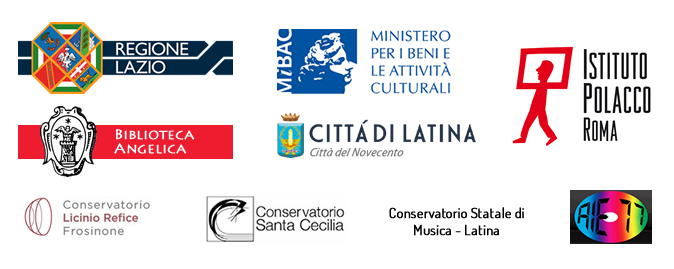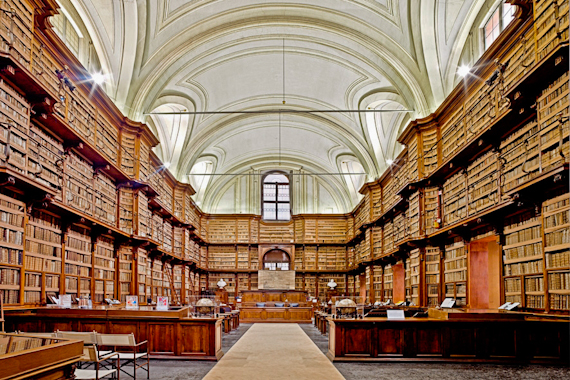Festival Pianistico di Roma XI Edizione
29 September – 14 December 2012
Biblioteca Angelica
Piazza Sant’Agostino, 8 – 00186 Roma – mappa
tel. 06 68408049 - fax 06 68408053
- Honorary President: Bruno Canino
- Vice President: Sandra Pen
- Artistic Director: Carlo Magni
- General Secretary: Nicola Tomasso Firmani
honorary committee
Franco Danieli – formerly Deputy Minister of Foreign Affairs
Fabiana Santini – Head of Culture of the Region of Lazio
Fiammetta Terlizzi – Director of the Biblioteca Angelica
Giorgio Bruno Civello – General AFAM
Edda Silvestri – Director of the Conservatory “Santa Cecilia” in Rome
Antonio D’Anto – Director of the Conservatory “Licino Refice” in Frosinone
Paul Rotili – Director of the Conservatory “Ottorino Respighi” in Latina
Jaroslaw Mikolajeski – Director of the Polish Institute in Rome
Giorgio Salimei – Italian Red Cross International Operations
Domenico Del Prete President of IEA 77
Giancarlo Iacomini – President of the Italian Movement of Contemporary Artists

the biblioteca Angelica
Piazza Sant’Agostino, 8 – 00186 Roma
tel. 06 68408049 – fax 06 68408053
e-mail: angelica.librari@beniculturali.it
The Biblioteca Angelica is the oldest public library in Rome, and along with the Ambrosiana in Milan and the Bodleian Library in Oxford one of the first in Europe, opened in 1604, owes its name to the Augustinian Bishop Angelo Rocca (1546-1620), which in the last years of the sixteenth century entrusted his collection of books to the monks of the convent of Sant’Agostino in Rome. Angelo Rocca, a passionate collector of precious editions, head of the Vatican Press during the pontificate of Sixtus V, gave the library a suitable location, own income, Regulation, and wanted it to be open to unlimited wealth. The absolute novelty of the institution desired by Rocca aroused the interest of an ever growing and the reputation of the library soon spread among the scholars of attracting other precious legacies: in 1661 Lucas Holste, keeper of the Vatican Library, left Augustinian friars to his valuable collection of printed volumes.

In 1762 it was bought the rich library of Cardinal Passionei, which doubled the assets of Angelica and especially the enriched texts that cardinal legate environments Jansenists Romans, researched and purchased on trips undertaken as papal legate in the countries of protest : This together with the presence of the leading advocates of Augustinian thought meant that they were acting as Angelica in a collection of texts crucial for studies and research on the period of the Reformation and Counter-Reformation. The acquisition of the impressive collection belonged to Cardinal Passionei necessitated a restructuring of the Biblioteca Angelica, that the Augustinian entrusted to the architect Luigi Vanvitelli, who in 1765 finished the construction of the hall.
In the nineteenth century the story of Angelica was marked by the historical events that affected the city of Rome: the invasion of the French in the proclamation of the republic Mazzini, which took place in 1849. The events of the Augustinians in Angelica came to an end in 1873 with the passage of the library to the Italian State.
The first decades of secular management of Angelica were marked by important acquisitions that significantly extended that culture collection of books, among them include a part of the library belonged to the principles Massimo (1884, 200 manuscripts and 450 printed volumes) and an important collection of published works by Giambattista Bodoni (1919), which was added to the editions Bodoni already owned by the library. At the end of the 800 library was enriched with a curious collection of 954 opera librettos of the nineteenth century, from the Minister Santangelo.
Since 1940 on deposit retains approximately 4,000 volumes of literary property of the Academy of Arcadia (printed books, 41 manuscripts, autograph letters and poems of the Arcadians Arcadian, which focused on the Italian literature of the ’700).
Since 1975, under the Ministry of Heritage and Culture. In the same year he purchased the library of the literary critic Arnaldo Bocelli, which includes texts of Italian literature of the twentieth century.


